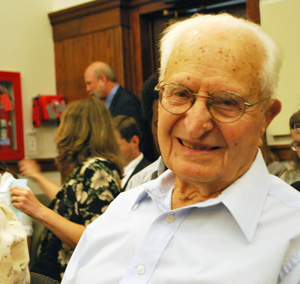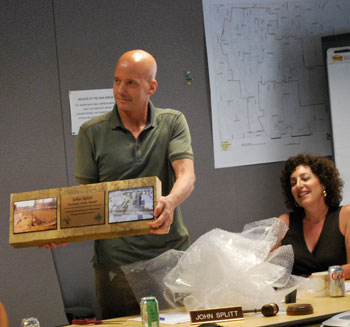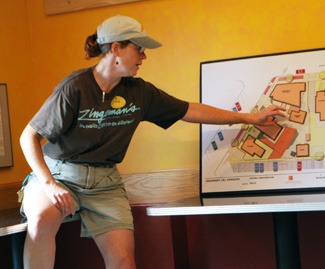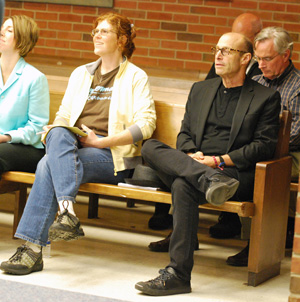Buckets of compost for sale in front of Zingerman’s Deli, $5 each. [photo]
Stories indexed with the term ‘Zingerman’s Deli’
Detroit & Kingsley
Two cute, sweatered pups tied up to a bike hoop outside of Zingerman’s Deli. [photo]
Zingerman’s Expansion Moves Ahead
Ann Arbor Historic District Commission meeting (Sept. 9, 2010): The last-minute addition of a closed session – which lasted nearly an hour, just prior to deliberations on the Zingerman’s Deli expansion – added a bit of drama to Thursday’s meeting. But ultimately commissioners unanimously approved all projects on their agenda, with only a few concerns cited.
Members of the Ann Arbor Historic District Commission talk with architect Ken Clein, right, in back of the Zingerman's Deli Annex on Sept. 7. Clein is with Quinn Evans Architects, which is handling the proposed expansion project. (Photos by the writer.)
The highest-profile of those projects, of course, was a plan to expand the Zingerman’s Deli operations at the corner of Detroit and Kingsley streets, in the Old Fourth Ward historic district. About a dozen representatives affiliated with Zingerman’s attended the meeting, including co-founder Paul Saginaw and managing partners Grace Singleton and Rick Strutz.
In 2008, commissioners rejected the company’s first attempt to gain HDC approval – in the form of a “certificate of appropriateness,” which included asking permission to tear down a small house on their property that had been gutted by fire. Since that initial rebuff by the HDC, Zingerman’s has been working on an alternative path, gaining approval from the city’s planning commission and city council, and returning to the HDC for a “notice to proceed.”
On Thursday, the commission granted the notice to proceed, which will allow the project to move forward. Several commissioners addressed concerns raised during public commentary about this project setting a precedent, saying that Zingerman’s is a unique business and this expansion is unique as well.
But commissioner Lesa Rozmarek, while noting that she would support the project and that overall Zingerman’s is an asset to the community, also said she wanted it on the record that she felt Zingerman’s had threatened the commission with the prospect of leaving the area if they didn’t get approval. The project sets a bad precedent, she said, adding that “it’s opening a big door that hopefully we can shut after this application.”
Later in the meeting Saginaw responded to Rozmarek’s comments, denying that anyone from Zingerman’s threatened to leave the city – though at one point they did consider moving out of that location to another site within Ann Arbor, he said. Saginaw said he believed the HDC was able to approve the project on its merits.
In other business, the commission issued certificates of appropriateness for three projects: 1) a solar panel installation at 217 S. Seventh St., 2) a request to add an exterior sign near the front door of 209-211 S. State St., where a CVS pharmacy is being constructed, and 3) a proposal for a 1.5-story addition on the back of 442 Second St.
The solar project is being installed on the home of Matt Grocoff, founder of Greenovation TV. Grocoff had attended last month’s HDC meeting, when two other solar panel installations were approved, including one at the historic Michigan Theater building on East Liberty. On Thursday, Grocoff told commissioners that when his solar panels are installed, his home will be the oldest in the nation to achieve net zero energy status, using only energy generated on-site. [Full Story]
No More “Felony Box” on County Job Forms
Washtenaw County board of commissioners (Aug. 4, 2010): A day after the primary election – one that brought victories to all commissioners who were running for office – the board faced a full agenda, but dispatched most of its business with minimal discussion.

Donald Staebler, who'll turn 100 later this month, was honored at Wednesday's county board meeting. He has lived on Staebler Farm, which is now owned by the county, for 98 years.
One item, however, yielded lengthy debate: A resolution that would remove the “felony box” from county job applications, and eliminate background checks for all jobs except those deemed sensitive. Several commissioners were uneasy with even partial elimination of background checks. The resolution was ultimately amended to deal with only the felony box, which asks applicants if they’ve ever been convicted of a felony. Commissioners ended up unanimously approving the removal of that question from job applications.
The board also agreed to put a 10-year millage renewal on the November ballot for the county’s natural areas preservation program, and approved brownfield plans for the Near North housing project and an expansion of Zingerman’s Deli. Both of the brownfield projects are located in Ann Arbor – brownfield status enables them to seek Michigan business tax credits and, in the case of Zingerman’s, to use tax increment financing (TIF) to get reimbursed for project-related expenses.
Commissioners got a second-quarter budget update, which revealed few surprises. However, projections indicate that the budget surplus they need to carry over into 2011 will fall short of their goal by about $987,000. Next year will be a challenging one.
The board had been expected to act on re-establishing a land bank for the county, but ended up tabling resolutions related to that effort until next month, citing the need to gather additional information.
The meeting also included time to honor two people from the community: Joseph N. Cousin Sr., pastor of Bethel AME Church in Ann Arbor, and Donald Staebler, a local farmer whose land is being turned into a county park – and who’ll turn 100 later this month. Both men received standing ovations for their work. [Full Story]
Zingerman’s Moves on to HDC
Ann Arbor City Council meeting (July 19, 2010): On Monday night, Zingerman’s Deli partners enjoyed complete support with no dissent from the city council, or the community at large, for their plans to expand the Detroit Street location. The council approved the site plan for the 10,000-square-foot addition, as well as a brownfield application.

Stephen Rapundalo (Ward 2) and Ann Arbor chief of police Barnett Jones chat during a break in the July 19 council meeting just after passage of a new pedestrian ordinance. During deliberations on that ordinance, Jones had cited the Canadian cultural practice of pedestrians standing on the curb and simply pointing to the crosswalk, which prompts motorists to stop for them. The remark had earned a thumbs-up from Rapundalo, who is a dual U.S.-Canadian citizen.
Intended as an extra measure of support for Zingerman’s was a third resolution communicating to the city’s historic district commission (HDC) the council’s view that the project represents a substantial benefit to the community. The proposal includes demolition of one house and the integration of another house into the architecture of the proposed new construction. Because the site is located in the Old Fourth Ward, the HDC will need to give its approval, in order for the project to be built. The message sent by the council to the HDC was clear: We want this project approved.
The council also sent a clear message to its firefighter and police unions, which the city hopes will soon ratify contracts that will save the city money. At the meeting, the council approved labor agreements with two other groups – the Teamsters civilian supervisors and the Teamsters police professional assistants. That added to bargained changes with the police deputy chiefs union that were approved at the council’s previous meeting on July 6. All three agreements reflected cost savings to the city through greater contributions by union members to health and retirement benefits and no increase in wages.
The implicit message to the firefighter and police unions was given explicit form through a position statement from the council’s labor committee and read aloud by Stephen Rapundalo (Ward 2), the chair of that committee. The statement calls on those unions to follow the example of the three who have already ratified contracts.
The council also gave final approval to a new pedestrian safety ordinance, which requires motorists to stop for pedestrians who are in, or even approaching, crosswalks that lack any traffic control device. During deliberations, the council swapped in “stop” to make the ordinance stronger than the originally proposed “yield.”
In other business, the council authorized the specific allocation of over $1 million in already-budgeted funds to nonprofits providing human services, approved liquor licenses for two downtown businesses, authorized the hire of a community energy coordinator using federal funds, got an update on the future of the Library Lot, and heard public commentary on a range of issues. [Full Story]
DDA Approves Grant for Zingerman’s
Ann Arbor Downtown Development Authority board meeting (July 7, 2010): In the main business at its regular monthly meeting, the DDA board approved a grant of up to $407,000 in support of a brownfield application by Zingerman’s Deli, which the deli is making to the state of Michigan. The board’s deliberations focused on the public improvements to sidewalks, curb ramps and signage as contrasted with the funding for LEED certification costs – a question of public versus private benefit.

At his last meeting as chair of the Ann Arbor Downtown Development Authority board, John Splitt shows off the tchotchke of appreciation he was given by executive director Susan Pollay. The board is a piece of the kind of lumber currently being used for the earth retention system in construction of the Fifth Avenue underground parking garage. To the right of the frame is Joan Lowenstein, who was elected chair of the board for the coming year. (Photo by the writer.)
The board also approved a recommendation for details of a payment-in-lieu-of-parking (PILOP) program that allows developers to build fewer parking spaces than otherwise prescribed by the zoning code. The program recommended by the DDA allows for developers to replace required on-site spaces with monthly permits – plus a 25% surcharge – in parking structures managed by the DDA.
The DDA made the recommendation to the city’s planning department because the department had requested the DDA’s input on PILOP after the city’s new rezoning of downtown A2D2 was approved last year by city council.
The board also approved revisions to the FY 2010 budget so that expenditures do not exceed budgeted amounts.
Immediately following the regular monthly meeting, the board held its annual meeting, during which executive director Susan Pollay ticked through the significant accomplishments of the board over the last year. Officers elected for the next year are: chair, Joan Lowenstein; vice chair, Gary Boren; treasurer, Roger Hewitt; secretary, Russ Collins.
Board member Newcombe Clark pointedly abstained from each of the four officer votes. [Full Story]
Zingerman’s Project Seeks Brownfield Status
The major renovation and expansion in the works for Zingerman’s Deli cleared its most recent major hurdle in May, gaining site plan approval from the Ann Arbor planning commission. While the site plan now moves on to city council, the business is taking action on another front as well: Applying for support from the local and state brownfield program.

Grace Singleton, a managing partner with Zingerman's Deli, talks about plans to apply to the local and state brownfield program as part of the deli's renovation plans. The business hosted a public meeting about the plans on June 21. (Photos by the writer.)
On June 21, Zingerman’s hosted a public meeting to answer questions about their plans for the brownfield application. Matt Naud, the city’s environmental coordinator, was on hand as well, and distinguished between this project and those that are typically associated with the term “brownfield.” In the case of Zingerman’s Deli, “it’s economic development,” he said, “It’s not about environmental cleanup.”
Specifically, brownfield status would allow Zingerman’s to be eligible for tax increment financing (TIF), a mechanism that would let the business recoup certain qualified expenses related to the project – possibly as much as $817,000 over 15 years.
It’s a different approach than the brownfield application most recently approved by city council for the Near North affordable housing project on North Main. In that case, the site’s need for environmental cleanup qualifies it for a brownfield status. Zingerman’s application also differs from Near North’s in that Near North isn’t seeking reimbursement through TIF. Both projects plan to apply for Michigan Business Tax credits. [Full Story]
Zingerman’s Deli Expansion Moves Ahead
Ann Arbor Planning Commission meeting (May 18, 2010): Two items with ties to Zingerman’s received approval from planning commissioners at their most recent meeting: The site plan for expansion of Zingerman’s Deli, and a special exemption use for the Westside Farmers Market, located next to Zingerman’s Roadhouse.

Grace Singleton, a managing partner of Zingerman's Deli, sits next to Zingerman's co-founder Paul Saginaw as the planning commission deliberates on a proposed expansion of the deli, which was ultimately approved. Behind Saginaw is Michael Quinn of Quinn Evans Architects, who is working on the project. (Photos by the writer.)
The farmers market has no further steps to take – it opens on June 3, from 3-7 p.m. But the approval process for the deli expansion is far from over. After seeking approval from city council for its plans, deli partners will need to circle back to the city’s historic district commission – the site is located in the Old Fourth Ward historic district. The Chronicle has previously reported on their earlier efforts down this path: “Zingerman’s: Making It Right for the HDC.”
Pending approvals, Zingerman’s hopes to break ground on the project early next year.
Also at last week’s meeting, commissioners reviewed the site plan for the Windsong affordable housing project off of Stone School Road, north of Ellsworth. They ultimately approved plans for building 32 townhomes financed in part by the Michigan State Housing Development Authority. But concerns were raised over problems that some residents in the site’s existing 12 townhomes are causing for their neighbors. Three of those neighbors spoke at a public hearing, saying they’d like a higher fence around the property, at the least, to deal better with harassment, fighting, graffiti and other issues. [Full Story]



